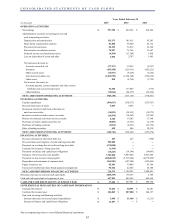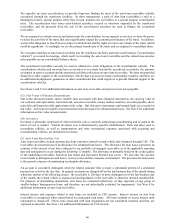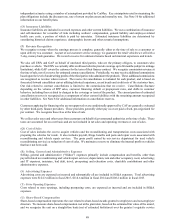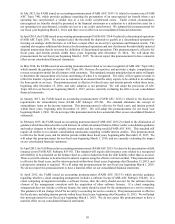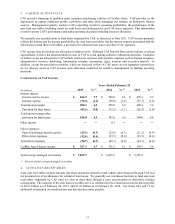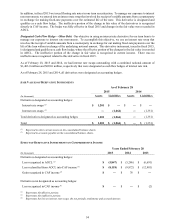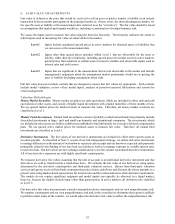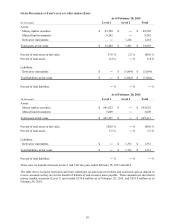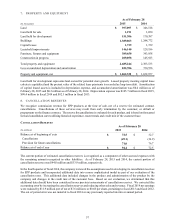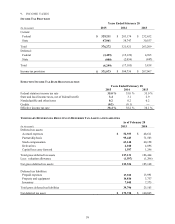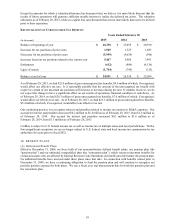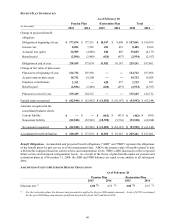CarMax 2015 Annual Report Download - page 54
Download and view the complete annual report
Please find page 54 of the 2015 CarMax annual report below. You can navigate through the pages in the report by either clicking on the pages listed below, or by using the keyword search tool below to find specific information within the annual report.50
In July 2013, the FASB issued an accounting pronouncement (FASB ASU 2013-11) related to income taxes (FASB
ASC Topic 740), which provides guidance regarding the presentation of an unrecognized tax benefit when a net
operating loss carryforward, a similar loss or a tax credit carryforward exists. Under certain circumstances,
unrecognized tax benefits should be presented in the financial statements as a reduction to a deferred tax asset for a
net operating loss carryforward, a similar tax loss or a tax credit carryforward. We adopted this pronouncement for
our fiscal year beginning March 1, 2014, and there was no effect on our consolidated financial statements.
In April 2014, the FASB issued an accounting pronouncement (FASB ASU 2014-8) related to discontinued operations
(FASB ASC Topic 205). The standard raises the threshold for disposals to qualify as a discontinued operation by
focusing on strategic shifts that have or will have a major effect on an entity’s operations and financial results. The
standard also requires additional disclosures for discontinued operations and new disclosures for individually material
disposal transactions that do not meet the definition of discontinued operations. This pronouncement is effective for
fiscal years, and interim periods within those years, beginning after December 15, 2014. We will adopt this
pronouncement for our fiscal year beginning March 1, 2015. We do not expect this pronouncement to have a material
effect on our consolidated financial statements.
In May 2014, the FASB issued an accounting pronouncement related to revenue recognition (FASB ASC Topic 606),
which amends the guidance in former ASC Topic 605, Revenue Recognition, and provides a single, comprehensive
revenue recognition model for all contracts with customers. This standard contains principles that an entity will apply
to determine the measurement of revenue and timing of when it is recognized. The entity will recognize revenue to
reflect the transfer of goods or services to customers at an amount that the entity expects to be entitled to in exchange
for those goods or services. This pronouncement is effective for fiscal years, and interim periods within those years,
beginning after December 15, 2016, and early adoption is not permitted. We will adopt the provisions of ASC
Topic 606 for our fiscal year beginning March 1, 2017, and are currently evaluating the effect on our consolidated
financial statements.
In January 2015, the FASB issued an accounting pronouncement (FASB ASU 2015-1) related to the disclosure
requirements for extraordinary items (FASB ASC Subtopic 225-20). The standard eliminates the concept of
extraordinary items on the income statement. This pronouncement is effective for fiscal years, and interim periods
within those years, beginning after December 15, 2015. We will adopt this pronouncement for our fiscal year
beginning March 1, 2016. We do not expect this pronouncement to have a material effect on our consolidated financial
statements.
In February 2015, the FASB issued an accounting pronouncement (FASB ASU 2015-2) related to the elimination of
guidance which has allowed entities with interests in certain investment funds to follow earlier consolidation guidance
and makes changes to both the variable interest model and the voting model (FASB ASC 810). This standard will
require all entities to re-evaluate consolidation conclusions regarding variable interest entities. This pronouncement
is effective for fiscal years, and for interim periods within those fiscal years, beginning after December 15, 2015. We
will adopt this pronouncement for our fiscal year beginning March 1, 2016, and are currently evaluating the impact
on our consolidated financial statements.
In April 2015, the FASB issued an accounting pronouncement (FASB ASU 2015-3) related to the presentation of debt
issuance costs (FASB ASC Subtopic 835-30). This standard will require debt issuance costs related to a recognized
debt liability to be presented on the balance sheet as a direct deduction from the debt liability rather than as an asset.
These costs will continue to be amortized to interest expense using the effective interest method. This pronouncement
is effective for fiscal years, and for interim periods within those fiscal years, beginning after December 15, 2015, and
retrospective adoption is required. We will adopt this pronouncement for our fiscal year beginning March 1, 2016.
We do not expect this pronouncement to have a material effect on our consolidated financial statements.
In April 2015, the FASB issued an accounting pronouncement (FASB ASU 2015-5) which provides guidance
regarding whether a cloud computing arrangement includes a software license (FASB ASC Subtopic 350-40). If a
cloud computing arrangement includes a software license, then the entity should account for the software license
element of the arrangement consistent with the acquisition of other software licenses. If a cloud computing
arrangement does not include a software license, the entity should account for the arrangement as a service contract.
The guidance will not change GAAP for an entity’s accounting for service contracts. This pronouncement is effective
for fiscal years, including interim periods within those fiscal years, beginning after December 15, 2015. We will adopt
this pronouncement for our fiscal year beginning March 1, 2016. We do not expect this pronouncement to have a
material effect on our consolidated financial statements.





